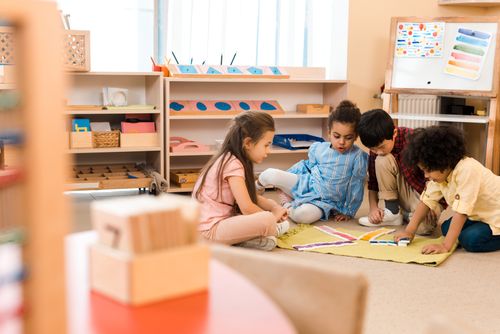
Why Bilingual Montessori Education is the Best Choice for Children
When choosing an educational path for their child, parents often compare several approaches, weighing the benefits of traditional schooling, bilingual programs, and Montessori education. But what if you could combine the best of both worlds? Bilingual Montessori education does just that, offering children a holistic, language-rich learning environment that fosters their cognitive, social, and emotional growth. Here are some compelling reasons why bilingual Montessori is better for children than the alternatives:
1. Cognitive Benefits of Bilingualism
Research consistently shows that bilingual children have enhanced cognitive flexibility, problem-solving skills, and executive functioning. Learning two languages simultaneously strengthens the brain's ability to switch between tasks, focus on priorities, and process information more efficiently (Bialystok, 2011; Marian & Shook, 2012). A Montessori environment, with its emphasis on self-directed learning and exploration, complements these cognitive benefits by encouraging children to think critically and independently.
2. Montessori’s Unique Approach to Language Learning
Montessori classrooms are designed to immerse children in a natural language-learning environment. In bilingual Montessori programs, children are exposed to both languages through meaningful interactions with teachers, peers, and carefully curated materials. Instead of rote memorization or isolated lessons, language acquisition becomes a natural and joyful part of daily life (Lillard, 2017). This approach not only builds fluency but also fosters a deep appreciation for cultural diversity.
3. Enhanced Social and Emotional Skills
In a bilingual Montessori setting, children develop empathy and cultural awareness as they interact with peers and teachers from diverse linguistic backgrounds. Understanding and speaking multiple languages opens doors to new perspectives, helping children build strong interpersonal skills and emotional intelligence (Garcia-Sierra et al., 2011). The Montessori emphasis on grace and courtesy further reinforces respectful communication and collaboration.
4. A Global Perspective for a Changing World
Today’s world is more interconnected than ever, and bilingualism is a significant advantage. A bilingual Montessori education prepares children to be global citizens, equipping them with the tools to navigate different cultures and connect with people across linguistic boundaries. This global perspective fosters adaptability and confidence, essential traits for success in the 21st century (Thomas & Collier, 2002).
5. Individualized Learning to Support Language Development
Montessori education is inherently child-centered, meaning each child’s unique learning needs and pace are respected. In a bilingual Montessori classroom, teachers tailor language instruction to the developmental stage of each child, ensuring that they are neither overwhelmed nor under-challenged. This individualized approach helps children build a strong linguistic foundation while nurturing their natural curiosity and love for learning (Montessori, 1967).
6. Integrating Practical Life Skills with Language Learning
Practical life activities are a cornerstone of Montessori education. In a bilingual Montessori program, these activities often incorporate both languages, allowing children to hear and use vocabulary in real-world contexts. Whether setting the table, gardening, or preparing snacks, children internalize language while developing essential life skills (Duffy & Duffy, 2002).
7. A Balanced and Joyful Learning Environment
Unlike traditional education models, which can sometimes prioritize academic rigor at the expense of creativity and exploration, bilingual Montessori classrooms strike a balance. They provide a rich linguistic environment without the pressure of high-stakes testing or rigid curricula. This joyful and stress-free approach fosters a lifelong love of learning and a sense of accomplishment in children (Lillard, 2017).
Conclusion
Bilingual Montessori education offers children a unique opportunity to grow into well-rounded, multilingual individuals with the cognitive, social, and emotional skills needed to thrive in an increasingly globalized world. By combining the proven benefits of Montessori pedagogy with the transformative power of bilingualism, this approach stands out as an unparalleled choice for parents seeking the best for their children.
At Language Garden Montessori School, we have seen firsthand the incredible growth and joy that bilingual education brings to our students. Our nurturing environment in Bellevue, WA, allows children to flourish as they explore both language and culture, setting the foundation for a bright future. Schedule a visit today to see the magic of bilingual Montessori in action!
#LanguageGardenMontessori #LanguageGardenMagic
References
- Bialystok, E. (2011). Reshaping the Mind: The Benefits of Bilingualism. Canadian Journal of Experimental Psychology.
- Duffy, M., & Duffy, D. (2002). Children of the Universe: Cosmic Education in the Montessori Elementary Classroom.
- Garcia-Sierra, A., et al. (2011). The Influence of Bilingualism on Emotional Processing. Journal of Cognitive Neuroscience.
- Lillard, A. S. (2017). Montessori: The Science Behind the Genius.
- Marian, V., & Shook, A. (2012). The Cognitive Benefits of Being Bilingual. Cerebrum.
- Montessori, M. (1967). The Absorbent Mind.
- Thomas, W. P., & Collier, V. P. (2002). A National Study of School Effectiveness for Language Minority Students' Long-Term Academic Achievement. Center for Research on Education, Diversity, and Excellence.


























